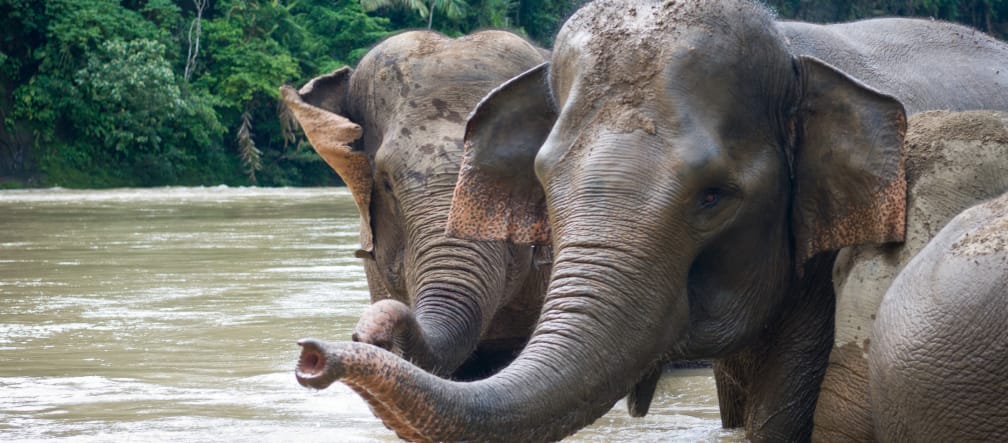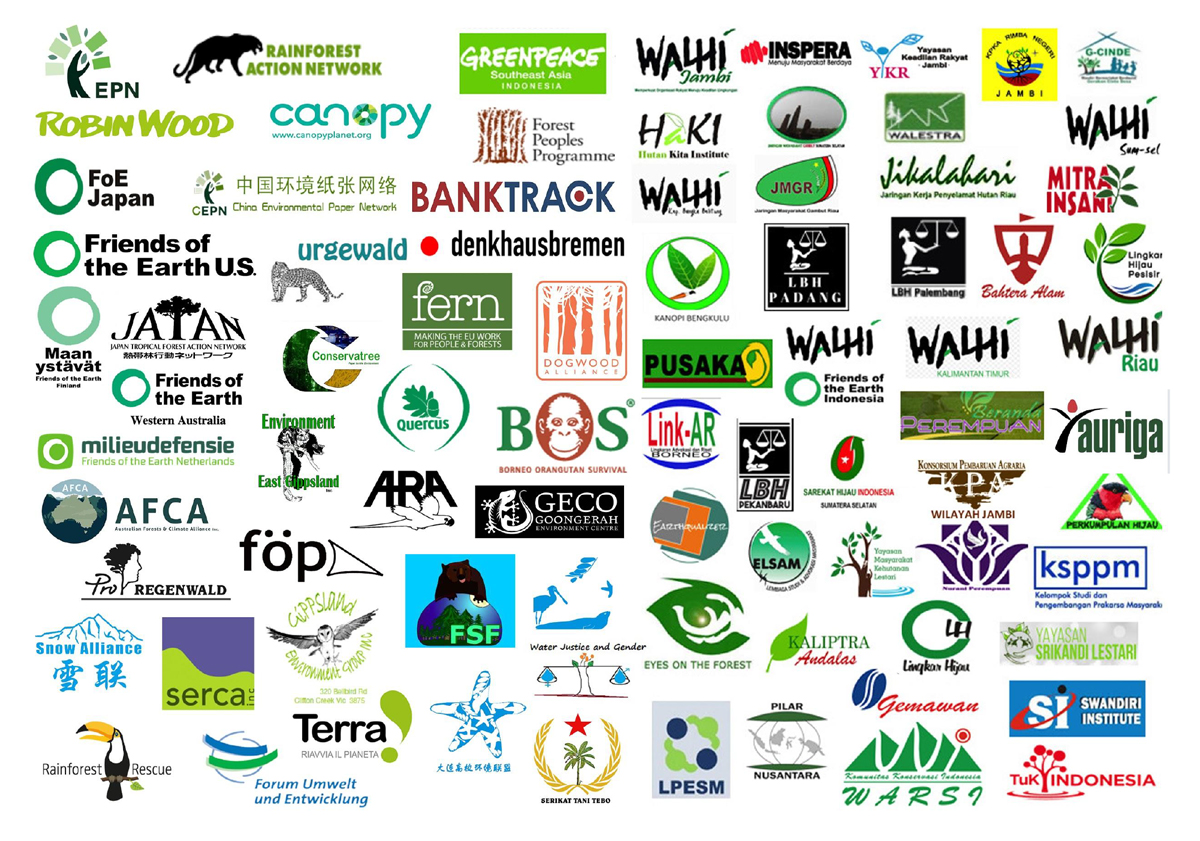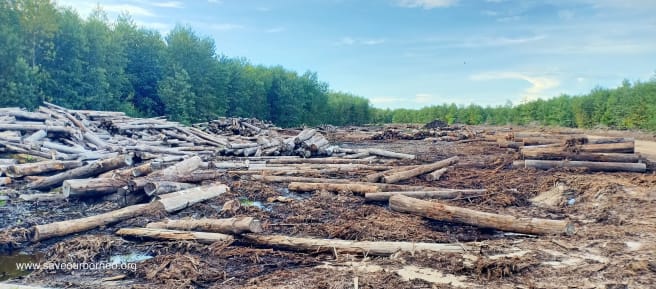
Ne faites plus d’affaires avec le papetier APP !
Le géant indonésien du papier APP détruit les forêts tropicales et bafoue les droits des populations depuis des années. Il est de nouveau accusé pour avoir pulvérisé du poison sur les champs et les jardins d’un village le 4 mars à Sumatra. Appelons les investisseurs et les entreprises à rompre leurs relations commerciales avec APP.
Mises à jourAux investisseurs et aux clients d'APP
« Des ONG écologistes et de défense des droits de l’homme portent de graves accusations contre le papetier APP. Merci de rompre vos relations d’affaires avec APP. »Pour répondre à la demande croissante de papier, des forêts tropicales sont converties en monocultures d’acacias. L’industrie papetière a sa part de responsabilité dans la déforestation, en particulier sur l’île indonésienne de Sumatra. Et elle est impliquée dans de nombreux conflits avec les populations locales, accompagnés de violences, d’intimidations et d’actes illégaux.
Le groupe papetier indonésien Asia Pulp & Paper (APP) est l’un des plus grands producteurs mondiaux. Le 4 mars, la société PT Wirakarya Sakti (WKS), qui est contrôlée par APP, aurait utilisé des drones pour pulvériser du poison sur les champs et jardins du village de Lubuk Mandarsah, menaçant ainsi les moyens de subsistance de ses habitants. WKS revendique le terrain pour une plantation d’acacias.
L’entreprise rejette les allégations.
Cet épandage ne serait pas un cas isolé : il existe de nombreux conflits entre les plantations ou fournisseurs d’APP et la population. Des ONG indonésiennes et le réseau Environmental Paper Network ont documenté 107 conflits portant sur 350 000 hectares de terres.
Depuis 2013, APP promet de respecter les droits de la population, de mettre en œuvre le principe du Consentement préalable, libre et éclairé (FPIC) et de résoudre les conflits sociaux. En octobre 2019, APP a affirmé déjà travailler à la résolution de la moitié de ces conflits.
Mais même après sept ans, les brutalités et pratiques d’intimidation semblent persister. Pire encore, la déforestation entraîne de nouvelles violences et actes illégaux.
90 organisations de défense de l’environnement et des droits humains appellent désormais investisseurs et clients à cesser leur relations d’affaires avec APP, ses filiales et ses fournisseurs jusqu’à ce que l’entreprise apporte des améliorations radicales tout au long de sa chaîne de production.
Lettre ouverte de quatre-vingt-dix organisations de défense de l’environnement et des droits de l’homme

Civil Society Open Letter About APP’s Recurrent Violation of Farmers’ Land Rights in Jambi, Indonesia
15 May 2020
Dear Madam/Sir,
We are contacting you about the destruction of community food resources in the village of Lubuk Mandarsah, Tebo Regency, Jambi Province, Indonesia, perpetrated by PT. Wira Karya Sakti (WKS). WKS is an industrial pulpwood producer affiliated with Asia Pulp and Paper Sinar Mas (APP Sinar Mas), one of Indonesian main pulp companies. On the morning of 4 March 2020, a drone sprayed poison on the community’s rubber trees, vegetables, and palm trees. This is the way PT Wirakarya Sakti resolved its conflict with the local community: by jeopardising the safety of their food and livelihood in the middle of the Covid-19 crisis.
This is not the first violation by WKS. In 2015, a farmer union leader, Indra Pelani, engaged in protecting community land, was brutally killed by WKS security.
Back in November 2019, the security team of PT Arara Abadi, another APP supplier, had arrested Pak Bongku, a member of the Sakai indigenous people, for planting sweet cassava in his ancestral land claimed by the company.
In areas sought by Indonesian pulp and paper giants for their business development, social conflicts that lasted one or two decades may intensify.
Indonesian paper giants repeatedly promised a fair resolution to all their social conflicts in the region, but now they seem to go back to their original attitude, dealing with conflicts using intimidation, violence and abuses.
This attitude is not only wrong, but may become dangerous and escalate violence, considering the scale of these conflicts:a comprehensive mapping done by EPN, together with a coalition of Indonesian NGOs, revealed that APP’s affiliates or suppliers are involved in conflicts with 107 communities in Indonesia, involving around 350,000 ha of disputed land.
In reaction to PT. WKS’s behavior towards local communities, and to prevent this from happening again, we urge buyers and financial institutions to take the following actions:
● NOT to do business with APP, its brands and / or affiliated companies, until it is proven and verified that APP has made radical changes across their business. The abuses committed in the Lubuk Mandarsah community, as well as the repression against the Sakai traditional community, are clear evidence of APP’s failure to resolve their social conflicts and respect community rights, despite their commitment to do so included in their Forest Conservation Policy. This is also one reason why NGOs keep questioning APP’s claim that, as of October 2019, they are on track to resolve about 49% of their conflicts with their concessions and suppliers.
● We, Indonesian and international organizations, encourage buyers and investors to avoid brands and papers linked to APP, Sinar Mas, Paper Excellence and their sister companies controlled by APP’s owner, the Widjaya family.
We hope all parties conducting business with APP, or planning to, will be able to take a strong position immediately in relation to the latest incident. We thank you in advance for your support and cooperation.
Sincerely,
ARA (Germany), Atap Hijau Indonesia -Lampung (Indonesia), Auriga Nusantara (Indonesia), Australian Forest & Climate Alliance (Australia), Bahtera Alam, Riau (Indonesia), BankTrack (The Netherlands), Beranda Perempuan (Indonesia), Blue Dalian (China), BOS (Germany), Canopy (Canada), China Environmental Paper Network (China), Conservatree (USA), Denkhaus Bremen (Germany), Dogwood Alliance (USA), Earthqualizer, Bogor (Indonesia), Edo Rakhman, WALHI Nasional (Indonesia), G-cinDe Jambi (Indonesia), Environment East Gippsland inc (Australia), Environmental Paper Network (International), Eyes on the Forest, Riau (Indonesia), Perkumpulan Hijau Jambi (Indonesia), FERN (Belgium), FoE US (USA), Forest Peoples Programme (UK), Forum Ökologie & Papier, (Germany), Forum Umwelt und Entwicklung (Germany), Yayasan PUSAKA Bentala Rakyat (Indonesia), Friends of the Earth (Finland), Friends of the Earth Western Australia (Australia), Friends of the Siberian Forests (Russia), Gemawan -West Kalimantan (Indonesia), Gippsland Environment Group (Australia), Glen Eira Environment Group Inc (Australia), Global Forest Coalition (international), Goongerah Environment Group (Australia), Greenpeace South-East Asia (Indonesia), HaKI South Sumatra (Indonesia), KPKA Rimba Negri (Indonesia), Yayasan Mitra Insani -Riau (Indonesia), INSPERA (Indonesia), Yayasan Keadilan Rakyat (Indonesia), Japan Tropical Forest Action Network –JATAN (Japan), Jikalahari, Riau (Indonesia), JMGR Riau (Indonesia), JMGS South Sumatra (Indonesia), Kaliptra Andalas Riau (Indonesia), Kanopi Hijau Indonesia -Aceh (Indonesia), Kanopi Hijau Indonesia -Bengkulu (Indonesia), Green of Borneo, Kalimantan (Indonesia), KKI WARSI -Jambi (Indonesia), KPA Regional Jambi (Indonesia), KSPPM North Sumatra (Indonesia), Perkumpulan Layung,West Kalimantan (Indonesia), LBH Padang (Indonesia), LBH Pekanbaru (Indonesia), Lembaga Bantuan Hukum Palembang, South Sumatra (Indonesia), Lingkar Hijau Pesisir -Riau (Indonesia), Linkar Borneo -West Kalimantan(Indonesia), LPESM Riau (Indonesia), Milieudefensie (The Netherlands), Perkumpulan Lingkar Hijau, South Sumatra (Indonesia), Perkumpulan Nurani Perempuan -East Kalimantan (Indonesia), Perkumpulan SALIM, South Sumatra (Indonesia), PINUS South Sumatra (Indonesia), Pro Regenwald (Germany),Quercus (Portugal), Rainforest Action Network –RAN (USA), Rainforest Rescue (Germany), Perkumpulan Walestra (Indonesia), Robin Wood (Germany),Scholar Tree Alliance (China), Serikat Hijau Indonesia -SouthSumatra (Indonesia), Serikat Petani Tebo, Jambi (Indonesia), (Indonesia), Snow Alliance (China), South East Region Conservation Alliance Srikandi Lestari -North Sumatra (Indonesia), Swandiri Institut, West Kalimantan (Indonesia), Terra! (Italy),TUK Indonesia (Indonesia), Urgewald (Germany), Lembaga Studi dan Advokasi Masyarakat (Indonesia), Walhi Bangka Belitung (Indonesia), Walhi East Kalimantan (Indonesia), Walhi Jambi (Indonesia), WALHI Riau (Indonesia), Walhi South Sumatra (Indonesia), Water Justice and Gender (Peru), Woods & Wayside International,Yayasan Masyarakat Kehutanan Lestari (Indonesia), Yayasan Sumpit -South Kalimantan (Indonesia)
Background information
● PT. WKS’ action of spraying poison by using drones, not only can damage community food security, but can also threaten the lives of the surrounding communities, including children and infants, as gardens are also the place where families and children socialize and play.
● Based on local community information and WALHI Jambi investigation, prior to the poisoning carried out by a group WKS officers, some community members who tried to peacefully stop the company activity in the conflict area, were intimidated and expelled by PT. WKS security officers.
● APP keeps violating its own conflict resolution protocol. In 2013 APP committed to resolve social conflicts by dialogue and to implement the FPIC procedure for all new activities that potentially would affect the communities. Instead the company poisoned the fields, threatened the villagers, and finally reported them to the police. Furthermore, following the report from PT. WKS on March 11, 2020, one community member received an attendance notice from the Tebo Resort Police.
● The village of Lubuk Mandarsah in Jambi is one of the villages identified in the NGO coalition report as an active conflict area between PT. WKS and the community. The report published in October 2019 stated that there have been 107 active conflicts and 600s potential conflicts involving APP in Indonesia. Conflicts in the Lubuk Mandarsah area have occurred since the early 2006. There have been several processes that have taken place since 2013, but WKS and APP are very slow and do not actively respond to and/or engage with community demands
Aux investisseurs et aux clients d'APP
Madame, Monsieur,
Votre entreprise entretient des relations d’affaires avec le groupe indonésien Asia Pulp & Paper (APP) en tant qu’investisseur ou que client.
L’APP est l’objet d’accusations répétées de destruction de forêt tropicale et de violation des droits de la population.
Dernière affaire en date : le 4 mars, la société PT Wirakarya Sakti (WKS), qui est contrôlée par APP, aurait utilisé des drones pour pulvériser du poison sur les champs et jardins du village de Lubuk Mandarsah et mis ainsi en danger les moyens de subsistance de ses habitants.
L’entreprise rejette les allégations. Toutefois, il convient de considérer cette réaction avec scepticisme compte tenu des pratiques commerciales passées et de ses réactions face aux abus.
Il est à craindre que la population locale et la nature doivent continuer à souffrir d’APP.
Quatre-vingt-dix organisations de défense de l’environnement et des droits de l’homme appellent désormais investisseurs et clients à cesser leur relations d’affaires avec APP, ses filiales et ses fournisseurs jusqu’à ce que l’entreprise apporte des améliorations radicales tout au long de sa chaîne de production.
Nous vous demandons d’agir de manière responsable dans cette affaire et de rompre votre relation commerciale avec APP.
Nous vous prions d’agréer, Madame, Monsieur, l’expression de nos respectueuses salutations.
La forêt tropicale est l’habitat naturel ayant la plus grande biodiversité au monde. Mais elle est gravement menacée. Chaque année elle perd environ 150.000 kilomètres carrés, soit plus de 40 terrains de football par minute !
Les arbres géants sont abattus pour l’industrie du bois et des meubles, ou pour faire place à des plantations immenses de palmiers à huile, de canne à sucre et de soja. Le poumon vert de la Terre disparait aussi à cause des mones d’or et de cuivre, de l’extraction de pétrole et des barrages électriques. Les conséquences sont dévastatrices :
• Environ la moitié des espèces animales et végétales vivent dans les forêts tropicales. Orang-outans, tigres et toucans ont besoin de la forêt pour survivre. A cause de la déforestation, 150 espèces disparaissent chaque jour.
• 60 millions d’autochtones vivent dans et de la forêt pluviale. Ils utilisent ses ressources sans la détruire. Mais ils sont de plus en plus souvent expulsés et menacés.
• Les forêts pluviales sont essentielles pour la stabilité du climat et la conservation des sols. Leur destruction aboutit à encore plus d’émissions de CO2 dans l’atmosphère, d’inondations et de glissements de terrains.
Telle est la réalité. Nous ne pourrons préserver les dernières forêts tropicales qu’avec votre aide !

La consommation de papier, d'emballages et de viscose à travers le monde a des conséquences dramatiques sur les forêts tropicales en Indonésie, comme le montre un nouveau cas à Bornéo. Sur place, notre partenaire Save Our Borneo documente la déforestation et demande l'arrêt immédiat de l'exploitation aux entreprises forestières.
Mais que fait l’Indonésie ? Le pays d’Asie du Sud-Est a approuvé la construction d’une route traversant Hutan Harapan, l’un des projets phares de son programme pour le climat. Sur place, les populations autochtones dénoncent la mise en péril de leurs moyens de subsistance et la fragmentation de l’habitat des tigres et des éléphants.